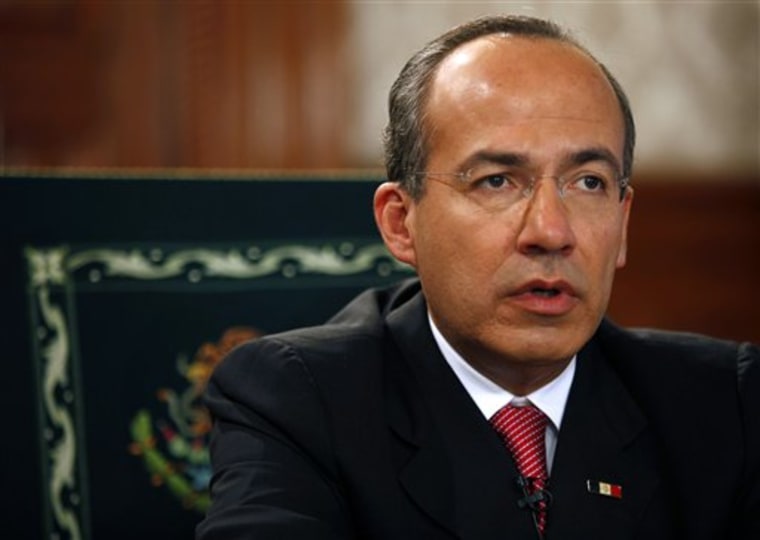President Felipe Calderon said Thursday he wants to defeat the world's most powerful drug gangs before his term ends in 2012, disputing U.S. fears that Mexico is losing control of its territory, though his government plans to send thousands of soldiers and police officers to one city to try to control drug violence there.
In interviews with The Associated Press, Calderon and his top prosecutor said the violence that killed 6,290 people last year — and more than 1,000 in the first eight weeks of 2009 — is a sign that the cartels are under pressure from military and police operations nationwide, as well as turf wars among themselves.
"To say that Mexico is a failed state is absolutely false," Calderon said. "I have not lost any part — any single part — of Mexican territory."
5,000 more troops for Juarez
Still, an army spokesman said Thursday that up to 5,000 more troops and federal police officers would be sent to the country's most violent city, where law and order is on the brink of collapse in a war between gangs supplying drugs to the United States.
The army said on Thursday the deployment could take the number of soldiers and federal police to more than 7,000 in Ciudad Juarez, which is across the U.S. border from El Paso, Texas.
Calderon, a Harvard-educated conservative, said smuggling cannot be eliminated as long as Americans continue to use drugs, but hopes he can beat back the cartels by 2012 to a point that the army and federal police can withdraw and leave the problem in the hands of local law enforcement. He declined to give a specific timeline for winning the war against drug gangs.
Mexico had bristled when the U.S. Joint Forces Command put it on par with Pakistan, saying both were at risk of "rapid and sudden collapse." That and other reports have put a global spotlight on Mexico's growing violence and pressured Calderon to change tactics. He said Thursday that wasn't an option.
"Yes, we will win," he said, "and of course there will be many problems meanwhile."
Key element of his administration
Calderon sent the army and federal police out into drug strongholds on his first day in office in December 2006, promising to turn a tide in a war that was seeing increasingly brazen tactics such as beheadings, assassinations and the attempt to control local governments.
Since then, Mexico has spent $6.5 billion on top of its normal public security budget, but that falls short of the $10 billion Mexican drug gangs bring in annually, Attorney General Eduardo Medina Mora said in another interview Thursday.
But violence has increased, more than doubling in 2008.
This month alone, drug hitmen killed 250 people in Juarez, where a meeting of cabinet members on Wednesday was rattled by three bomb scares, forcing soldiers to briefly shut the city's international airport.
Drug trade analysts say Mexico's most-wanted fugitive, Joaquin "Shorty" Guzman, who leads a cartel from the Pacific state of Sinaloa, wants control of Ciudad Juarez, currently in the hands of local drug lord Vicente Carrillo Fuentes.
Law and order in Ciudad Juarez is close to collapse as Guzman's hitmen seek to destroy the Juarez cartel's entire operation, drug experts say, and kidnappings and extortions of business people are rampant.
'They are melting down'
But Medina Mora said the increased violence does not reflect the drug gangs' power; "It is reflecting how they are melting down."
As proof, he said street prices of cocaine in the United States have doubled in the last three years, while purity has dropped by 35 percent. He said the government has crippled Mexico's methamphetamine trade by banning precursor chemicals.
Medina Mora predicted Mexico is "reaching the peak" of the violence, adding that the government's goal is to make smuggling through Mexico so difficult that the drug gangs are forced to look elsewhere.
"We want to raise the opportunity cost of our country as a route of choice," he said.
Even as he spoke, five more suspected drug killings were announced by authorities in the Pacific coast state of Guerrero. The men were shot Wednesday night.
Medina Mora said 90 percent of the dead are involved in the drug trade, while only 4 percent are innocent bystanders. The rest — some 800 to date — are police officers and soldiers.
More demanded of U.S.
Both Calderon and Medina Mora called on the United States to do more, by stopping the flow of powerful U.S. assault weapons and mountains of drug cash into Mexico. Calderon, whose government has arrested more than 25 high-level officials for suspicion of taking drug bribes, also called for the United States to purge its own corrupt officials.
"I'm fighting corruption among Mexican authorities and risking everything to clean house, but I think a good cleaning is in order on the other side of the border," he said.
Calderon applauded cross-border efforts that the U.S. said culminated this week with the arrests of 755 Sinaloa cartel members and seizure of $59 million in criminal proceeds in the United States. But he acknowledged that Mexico cannot be the top U.S. priority, saying President Obama would help Mexico most by fixing his own economic crisis.
He expressed optimism that Obama will improve relations in the region, saying Latin American leaders have high expectations for his first trip to the region at the Summit of the Americas in April.
"President Barack Obama has a tremendous opportunity to recover the leadership of the United States," he said.
